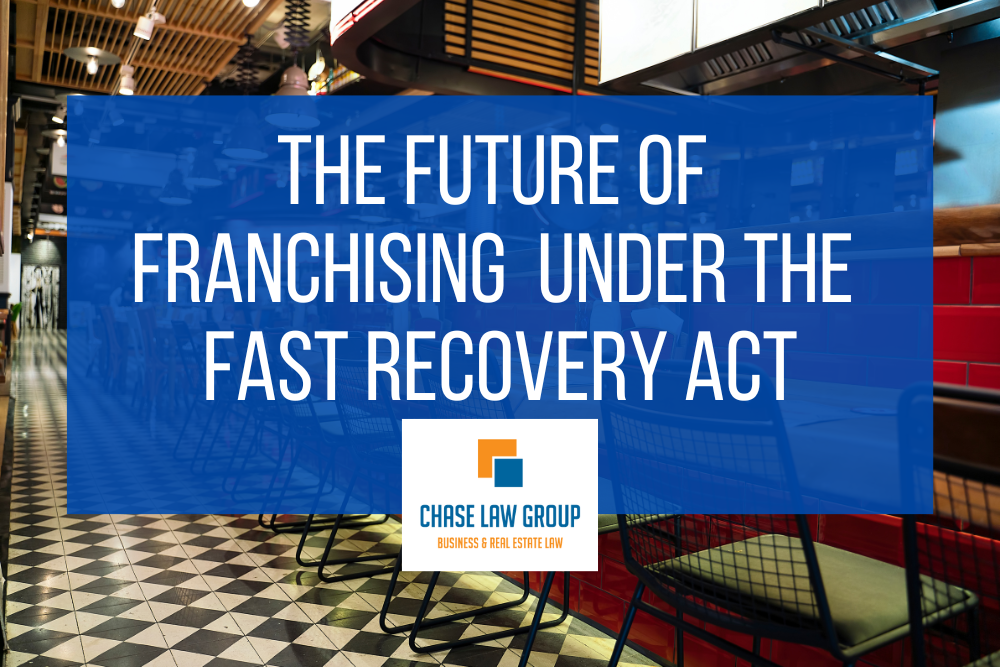The Future of Franchising Under the FAST Recovery Act
By Admin September 21, 2022 Category: Business Law

The California legislature has passed, and Governor Newsom has signed into law, AB257—the “Fast Food Accountability and Standards Recovery Act” or “FAST Recovery Act.”
The FAST Recovery Act tentatively establishes a new Fast Food Council within the California Department of Industrial Relations, but the council will not have full authority until the Director of Industrial Relations receives a petition signed by at least 10,000 California fast-food employees approving creation of the council. The Fast Food Council will have ten members, eight of whom must meet certain criteria (such as representing fast-food restaurant franchisors, franchisees, or employees), and will be appointed by the Governor. The other two members must be “advocates for fast-food restaurant employees” and will be appointed by the Senate Rules Committee and the Speaker of the Assembly. This council will have the power to establish state-wide minimum standards for wages, working hours, and other conditions relating to the health, safety, and working conditions of employees in the “fast food industry.”
For purposes of this law, the “fast food industry” is not defined to encompass every fast-food restaurant in the state; rather, it is limited to restaurants that are part of a chain that consists of at least 100 restaurants nationally that share a common brand or are characterized by standardized options for decor, marketing, packaging, products, and services. In other words, it is squarely aimed at franchised restaurants (even though there are a small number of non-franchised restaurants, such as In-N-Out Burger, that satisfy the definition).
Frandata (a company that provides research, analysis and information concerning franchised businesses) has stated that there are 176 fast-food brands nationwide that have more than 100 units, of which 148 do business in California. Those 148 chains collectively operate or franchise over 16,000 locations in California through more than 5,000 different franchisees.
So, what does the FAST Recovery Act mean for franchising in California and elsewhere? The answer is not entirely clear.
In addition to increases in minimum wages payable to employees of fast-food restaurants (discussed below), the FAST Recovery Act has numerous provisions that are intended to protect employees of fast-food restaurants. The Fast Food Council can establish standards that apply to employees of fast-food restaurants concerning working conditions, security, health and safety, and similar matters. Employees who are discharged or are discriminated or retaliated against for complaining or refusing to work because of violations of the standards are given powerful tools to respond (including a presumption of a violation if adverse action is taken by the employer within 90 days after the employee files a complaint, as well as treble damages and attorneys fees).
But the change that seems to be drawing the most attention is that the Fast Food Council can (and probably will) impose a minimum wage for covered fast-food restaurant employees of up to $22 per hour (which is a bit more than 50% higher than the otherwise-applicable statewide minimum wage). That amount can be increased annually based on inflation (but not more than 3.5% each year). Although, on its face, this new minimum wage will apply only to fast food restaurants that are part of a larger chain, there is a significant probability that fast food restaurants that are part of smaller chains will need to raise their own wages to avoid losing employees to covered companies. That may also put pressure on wages paid by other employers—both restaurants that do not satisfy the definition of “fast food restaurants” under the law, as well as companies that are not restaurants but compete for the same pool of employees (such as convenience stores). It may even cause businesses in completely unrelated industries to raise their wages.
Those higher wages (however wide-spread they end up being) will either cut into the profit margins of employers, cause the companies to raise prices (to the extent permitted by other economic pressures), or both. Longer-term consequences are harder to predict; for instance, the higher wages (and prices, to the extent they increase) could increase inflation in California—and, because California accounts for almost 15% of U.S. Gross Domestic Product, could also increase inflation nationwide. Whether there would be increased immigration into California (to receive the higher wages) or emigration out of California (to avoid the higher wages) is harder to predict. Also hard to predict is whether these higher wages (and other changes) will make it harder to sell franchises in California (or even cause some number of franchisors to stop selling new franchises in California), and whether other states will enact similar laws.
There is already talk about trying to get an initiative on the ballot in November 2024 to repeal the law. To qualify for the ballot, the proponents of the referendum will need to gather more than 600,000 signatures by April 1, 2023. Whether or not the effort to put the bill to a referendum succeeds, there are likely to be at least one legal challenge to the law (and there may be many).
To quote Bette Davis’s line in All About Eve, “Fasten your seat belts, it’s going to be a bumpy night.”
If you have questions about these developments and how they may impact you as a fast-food restaurant or other type of franchisor, franchisee, attorney Brian H. Cole specializes in corporate and transactional work in Franchise and Distribution Law. Contact Brian Cole at [email protected].

